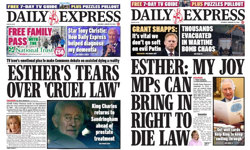Lee Marlow
Lee Marlow, a feature writer on the Leicester Mercury says: “Journalism – the best journalism, anyway – should always be about people.”
I’ve persuaded Marlow, Press Gazette’s Feature Writer of the Year in 2009 and then the Society of Editors’ Feature Writer of the Year in both 2014 and last year, to explain his secrets behind being an award-winning journalist.
And this thoughtful hack insists that for him, it’s always about concentrating on the human being behind every story. “What they're saying, what they’re doing, how things affect them,” he says.
“I remember a girl I went to school with updating her Facebook status to say she was booked in to have a hysterectomy. She was 40. She wasn't ill. It transpired she was so fed up of pre-menstrual mood swings she decided this huge operation was her only option.
“I asked to interview her – expecting that she'd quite rightly tell me to p*** off and mind my own business. ‘I’d love to,’ she said. ‘No-one ever speaks about this.’ It was a two-page feature in the Mercury, then a two-page feature in the Mirror, then Chat, and a lengthy TV appearance on This Morning with Phil and Holly. She was delighted.”
Marlow says that many of his award-winning features focus on tragedy: “The most compelling stories are the tragic ones, because there’s drama there. Real, tangible, multi-layered, heart-breaking human drama. They’re harder to find, trickier to persuade people to talk about, more difficult to write – but they're always the best features.”
But Marlow’s memories of a more investigative story make me smile: “I followed Keith Vaz [Labour MP for Leicester East, and chairman of the Home Affairs Select Committee] all over Leicester to ask him impertinent questions about his expenses and silk cushions, which I enjoyed more than I should, perhaps …”
Marlow admits to “constantly moaning” about his job, but he still finds it “a privilege” to “talk to people, to sit in their homes, to hear their stories”. He’s a big fan of social media: “It’s a great way of spreading news – and finding it. My Twitter and Facebook accounts are open on my desk every day.”
And his top tips include reading: “Read it all. Good books, bad books, journalism, good magazines. It all helps. Find people who do good things – I like Lynn Barber in the Sunday Times, Rachel Cooke in the Observer, Caitlin Moran, Alex Bilmes in Esquire and so many more – and learn from them.
“Remember: aim your ire at the powerful and the rich and the privileged and the politicians. Rattle their cages. That’s your job. Save kid gloves for the people who genuinely deserve it.
“And don’t trust press officers. I scoff at people – press officers, usually – who claim press officers and journalists are two sides of the same coin. They’re not. It’s their job, mainly, to conceal the truth. It’s our job to find it.”
Jon Griffin
Jon Griffin, who spent eighteen years as business editor at the Birmingham Mail until last summer, won his first award back in 1977.
It was the General Practice prize for that year’s outstanding candidate in what used to be the Proficiency Test, run by the National Council for the Training of Journalists. A young Griffin’s reward was an interview with Prince Charles at Windsor Castle, the story circulated to all UK evening papers.
Griffin went on to win the Midlands’ Business Journalist of the Year award ten times in the last eighteen years, and was the UK’s Business and Finance Journalist of the Year in 2011 and 2015 in The Regional Press Awards.
His latest awards came for stories that included the controversial ‘Phoenix Four’ – the former bosses of the failed MG Rover – who paid themselves an extra £1m each via an obscure trust fund. His favourite ever single story was a face-to-face interview with notorious gangster Ronnie Kray in 1989: “I was on the Express & Star at the time and a Wolverhampton-based contact with links to the London underworld smuggled me into Broadmoor to interview Ronnie.”
Griffin’s top tips: “It’s contacts that still count more than anything. Plus an acute news sense, suspicion of all authority, writing ability, a good shorthand note, and constant awareness that you're only ever as good as your last story. After all those and several others, I might consider the ability to tweet or rabbit on Facebook…”
Griffin, who now freelances, adds: “It’s still the best job in the world if you're allowed time to go out and get your own stories. Never give up aiming to do that, and never betray a contact.”
Adam Smith
Adam Smith, a reporter at the Halesowen News, won the Midlands’ News Reporter of the Year title for the second year running in 2015. As well as newspapers, he presents the outrageous Steve Zacharanda Radio Show on scratchradio.co.uk. And in 2012, he authored Obama and Me: The Incredible True Story of a YouTube Sensation, again under his Steve Zacharanda pseudonym, describing how he once resigned via online video from the Birmingham Mail, (when I was his long-suffering editor!).
But as well as being a loveable rogue, Smith’s an exceptional journalist. His first award was a local Scoop of the Year back in 2003 for his work on a Handsworth murder story. His latest came after several offbeat tales including a demand for the return of Rowley Regis’ treasured Nazi flag, recovered from a German warship, and drug dealers using drones to find and steal fellow criminals’ cannabis crops.
It’s a funny story that he likes the most: “It was about a Shameless-style family who knocked two council houses into one and turned it into a club with a bar and sauna powered by paint strippers!”
Smith is succinct on journalistic skills needed in 2016: “Have credit on your phone and a battery charger on you at all times. Use Twitter to uncover stories and to ask the powers-that-be why they’re not answering your questions.”
And his top tips: “If you start a story, finish it. Something half done is nothing, where even a badly-finished story is something you can learn from.
“Never let anyone tell you: ‘That isn’t a story’ – especially the person you’re asking for a comment. And treat everyone you ever meet as a contact: I’ve got great stories from my mom, my girlfriends’ moms and even my ex-girlfriend’s baby’s father’s brothers!
“Finally: learn to read upside down, always earhole conversations and read All the President’s Men to remind yourself what can be achieved.”
Martin Naylor
Martin Naylor’s first award was Student Journalist of the Year in 2006 at Nottingham Trent University, where he re-trained at the age of 38.
He’s now a Derby Telegraph reporter and won Scoop of the Year in the 2015 Midlands Media Awards. This came after he saw a half-concealed face flash up on TV’s Panorama: “It was a man who was in Iraq and whose disguised voice told viewers he was a British ISIS fighter who wanted to become a suicide bomber.
“I racked my brain and in the morning, it struck me who he was: a Derby man I’d previously covered in two trials when he was convicted of spreading hatred on the grounds of sexual orientation.
“The story developed into a page one-to-five exposé of Kabir Ahmed, with a full backgrounder on his previous offences. Tragically, his wish to become a suicide bomber came true in 2014 when he killed himself and eight Iraqi police officers.”
Thinking about the skills journalists need, Naylor points to personality ahead of multi-media: “Never mind taking photographs and video with an iPhone at the scene of a breaking story, or lightning fingers tweeting something, the key skill needed is the ability to communicate.
“People will only open up if they like you and trust you. If you show your subject compassion and humility, you’ll see beyond the face-value story and dig deeper.”
Naylor develops this human element into his top tips: “Talk to people. Don’t send them an email, text them or tweet them, TALK to them. Get out there and meet your contacts face-to-face and start forming relationships. The best stories almost always come from a tip-off, and tip-offs only come from people who’ve met you, like you and trust you.”
Jeanette Oldham
Jeanette Oldham, investigations editor for the Birmingham Mail and Sunday Mercury, won the Local Heroes trophy at last year’s British Journalism Awards. She was also Specialist Reporter of the Year at the Regional Press Awards in 2014, picked up Scoop of the Year at the same awards in 2011, and has a collection of trophies from the Midlands Media Awards in 2006, 2010 and 2011.
Her latest award came after a series of exclusives uncovering failings by West Midlands Police and councils in tackling child sexual exploitation. She says: “We told how research for a Birmingham City Council report linking abuse victims with Asian taxi drivers had been ‘buried’ more than twenty years ago.
“A secret West Midlands Police report had found 75% of on-street groomers were Asian, with 82% of victims aged 14 to 16 being white. We forced the release of previously confidential police profiles which revealed the full extent of the problem.”
Another story involved a cancer surgeon Oldham was told had higher-than-average death and surgery complication rates. “The trust involved had been told of concerns months earlier and had commissioned the Royal College of Surgeons to investigate. They delivered a devastating report … and crucially told the trust to notify his patients, but instead they carried out their own review which lasted months.
“None of his patients were told until we contacted the trust the day before we went to press. The surgeon has now been sacked and police are investigating the deaths of three patients. The obvious point is that you cannot always rely on public bodies to do the right thing.”
Oldham advises aspiring journalists to do their research: “I’d encourage endless reading and research. You won't spot a story if you don't know what’s normal and when something ain’t right.
“And I'd encourage any young reporter to get a grounding in everything before they decide to specialise. They should also ‘look elsewhere’. There’s no point looking at what everyone else is looking at, talking to someone everyone else talks to. You have to find people who only deal with you.”
Her final advice – bringing me back to where I started – begins with a single word: “Contacts. There’s no greater tool. People, what they can tell you, and the significance and understanding they can bring to an issue is at the heart of everything a journalist should do.”












